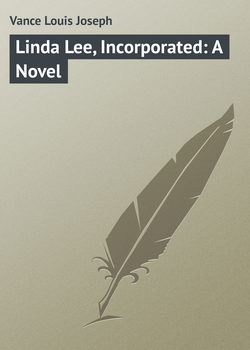Читать книгу Linda Lee, Incorporated: A Novel - Vance Louis Joseph - Страница 13
XII
ОглавлениеThough they had left the Metropolitan long before the final curtain, on Broadway the midnight tidal bore of motor traffic was even then gathering way and volume, the first waves of after-theatre patrons were washing the doorsteps of those sturdy restaurants which had withstood the blast of Prohibition, the foyer of the Palais Royal already held a throng of some proportions. In this omnium-gatherum of confirmed New Yorkers and self-determined suburbicides, arrayed in every graduation of formal, semi-formal and informal dress, and drawn together by the happy coup of that year's press-agent in heralding the establishment as a favorite resort of what the Four Million still styles its Four Hundred, the women stood grouped in their wraps and wistfully watching their men-folk importune a headwaiter who was heroically holding the staircase against all-comers, passing only the fore-handed in the matter of reservations, and putting all others to ignominious rout with the standardized statement that there was not a table upstairs left untaken.
At first glance, the huge main room on the second story, with its serried semicircles of tables and its flamboyant colour scheme, seemed less frequented by clients than by waiters; but the influx of the former was constant, and when, shortly after Lucinda and Daubeney had been seated, a gang of incurable melomaniacs crashed, blared and whanged into a jazz fox-trot, the oval dance floor was quickly hidden by swaying couples.
For some minutes Lucinda sat looking out over without seeing these herded dancers, only aware of the shifting swirl of colour and the hypnotic influence of savage music, her thoughts far from this decadent adaptation of jungle orgies which she had come to witness. And presently a smile began to flicker in the depths of her eyes.
"Oh!" she said, rousing when Daubeney uttered a note of interrogation – "I was thinking about this afternoon, remembering that funny little man moping and mowing in his magnificent delusion that he was conducting an orchestra."
"It was amusing, illuminating, too. One begins to understand why the movies are what they are. If I'm not mistaken, the author of that asinine exhibition is rated as one of the ablest directors in the business."
Lucinda quoted Mr. Lane's eulogy of King Laughlin.
"Well, there you are," Dobbin commented. "I presume genius must be humoured in its poses; even so, I saw nothing in Laughlin's directing to offset the silliness of his performance with the orchestra. I should say the business is poorly organized that permits men of his calibre, with so little sense of balance, to hold positions of absolute authority."
"You don't think Mr. Lane may have exaggerated Mr. Laughlin's importance – "
"Perhaps; though he was honoured with suspicious reverence by everybody present."
"Except Mr. Culp."
"Well, yes; Culp didn't seem so much overpowered. All the same, I noticed he didn't attempt to call Laughlin to order."
"But possibly the man is a genius. He seemed to know what he was about when he was showing them how to play that scene."
"I'll admit his grasp of primary mechanics; but the scene as he built it would have been ridiculous in the theatre."
"But it wasn't for a theatre, it was for the movies."
"Precisely my point. Why should motion-picture plays be less plausibly done than plays on the stage? The American theatre outgrew 'Nellie, the Beautiful Cloak Model' long before motion-pictures were seriously thought of; I mean, American audiences outgrew such trash. Yet today our movies are shaped on identically the lines of the popular melodrama that was laughed off the boards a generation ago. There's something wrong."
For some reason which Lucinda didn't stop to analyze, Daubeney's arguments stirred up a spirit of contentiousness.
"At all events, Mr. and Mrs. Culp seemed satisfied."
"Two people who have made a huge lot of money in an astonishingly short time: it isn't likely they'd be disposed to interfere with the system that enriched them, even allowing that they are sensible of its defects."
Lucinda caught herself frowning, then had the grace to laugh. "Can't make me believe they're lacking in artistic appreciation, Dobbin."
"Why not?"
"You don't know about the handsome offer Mr. Culp made me, with his wife's approval, just as we were going away."
